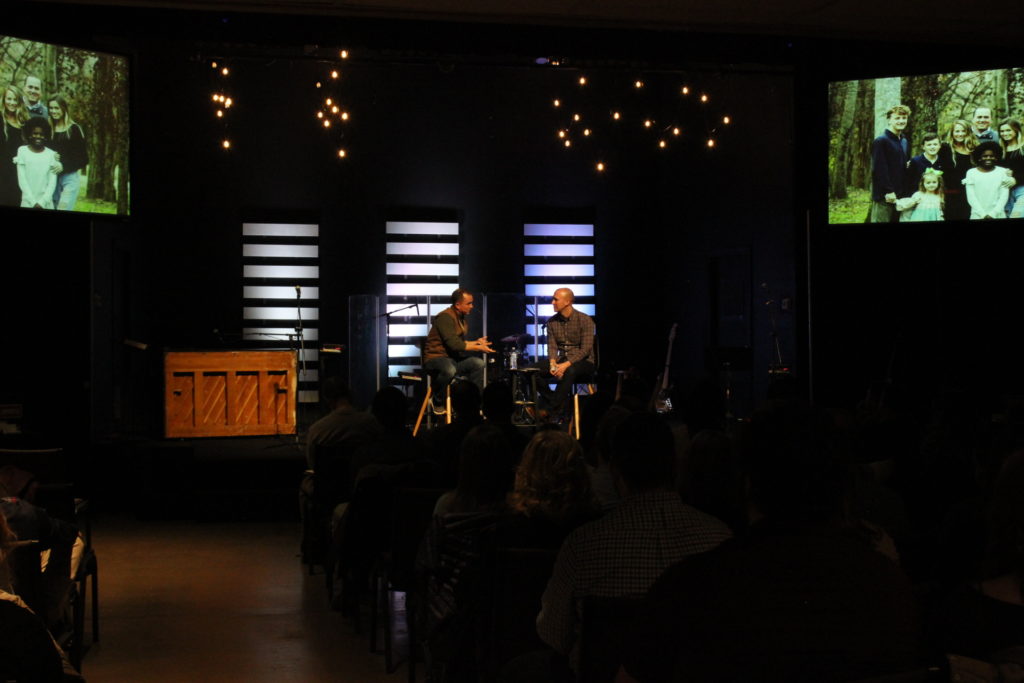The Apostle Paul says that we have “exchanged” what we should hallow, or worship, in our hearts with things we shouldn’t. He says, “because they exchanged the truth about God for a lie and worshiped and served the creature rather than the Creator, who is blessed forever! Amen” (Rom. 1:25).
Notice that Paul doesn’t say that we “quit” or “stopped” worshiping (worshiping is simply another way of describing “hallowing”). He says that we “exchanged.” Your heart is designed by God to hallow the true God. But, because of sin, we “hallow” other things.
I saw the inescapable hallowing function of the human heart most clearly in my kids when they were going through the “Night-Night” stage. The “Night-Night” is what they called a specific blanket that they loved most. It’s the blanket that helped them to transform from terrified to tranquil, from unstable to stable, from loud to quiet and content.
We called it the “secret weapon.” When we dropped the kids off in the Children’s Ministry on Sunday mornings. We told the workers, “if they won’t stop crying, break this blanket out, and they’ll be fine in a minute or so.” The “Night-Night” was undefeated.
And there’s the thing about the “Night-Night.” There was nothing special about the blanket. We didn’t put anything on the blanket, like special oils or fragrances or anything illegal, to get them to like those blankets. All of the kids were given multiple blankets and all of the kids would choose just one of those blankets that would “work.”
It wasn’t about the blanket, it was about their hearts. Their hearts ascribed a certain value on those blankets that wasn’t true about those blankets. It was the kiddy version of what Paul was talking about.
As we get older, we leave our blankets behind, but our hearts are still making the same silly exchange—hallowing the creation over the Creator. We base our inner sense of well-being on people’s opinions, how much money we have in the bank, how “in control” we feel, and the like.
Do you know what your “Night-Night’s” are?
The Bible calls these “Night-Night’s” idols. And everyone struggles with them. Tim Keller, in his book Counterfeit Gods, describes these idols as “anything more important to you than God. Anything that absorbs your heart and imagination more than God.”
What might these be? Not usually bad things. They are typically good things.
Some people’s hearts and, therefore, days, are controlled by the idol of approval. If they are affirmed like they want, then they feel good about life, where it’s headed, and the journey they’re on. If they’re not affirmed, then they feel frustrated, angry, scared, embarrassed, worthless, or some other life-taking emotion.
The Bible affirms the goodness of approval in others eyes in passages like Proverbs 22:1, “A good name is to be chosen rather than great riches, and favor is better than silver or gold.” But sinful hearts have to be careful that this good thing, a “good name,” doesn’t get turned into a God thing that we have to have, that we base our heart’s contentment on. Jesus’ name was slandered by almost everyone, but his satisfaction was taken away by no one. If people’s opinions controlled his purpose, and not his heavenly Father’s opinion, he never would have did what was necessary on the cross to bring salvation to the world.
Do you tend to make an idol out of people’s opinions?
Other people don’t worry about what people think that much. Instead, their hearts and, therefore, their days, are controlled by the idol of productivity. If they are performing like they want to be performing, then they feel good about life, where it’s headed, and the journey they’re on. If they feel unproductive, behind, or anything like this, they feel frustrated, angry, scared, embarrassed, worthless, or some other life-taking emotion.
God is “pro-productivity.” He works, designed humanity to work, created the standards for productivity, and provided tons of instruction on how to work in the Bible. Jesus did the greatest work ever imaginable by purchasing salvation for sinners. But God didn’t create any work, or work process, that he wants you to replace him with. In fact, he commanded us to “rest” from our work so that we’d be reminded that it’s his work that makes the kingdom advance.
Do you tend to make an idol out of working?
But there are other people who don’t care if they are productive or if people have a high view of them, they struggle, instead, with the idol of comfort. If they are resting like they want to be resting, then they feel good about life, where it’s headed, and the journey they’re on. They’re more patient and loving towards people when they are in this place. But if they feel uncomfortable, overbooked, or anything like this, they feel frustrated, angry, scared, embarrassed, worthless, or some other life-taking emotion.
God is “pro-comfort.” He knows that rest is a good thing, which is why he commanded that we “rest” each week. But he wants us to know that our “rest” has limits. He wants us to be productive (Col. 3:23).
Do you tend to make an idol out of rest?
Another major way that people take good things in our lives and replace God with them is with possessions. People that struggle with the idol of stuff, feel good about life, where it’s headed, and the journey they’re on, if they have a certain level of “stuff.” There bank account needs to be at a certain level. Their car, apartment, house, or whatever, needs to look a certain way. If they aren’t at their “level” of stuff, then they feel frustrated, angry, scared, embarrassed, worthless, or some other life-taking emotion.
God loves “stuff.” After all, he created it! But he doesn’t want us to value “stuff” more than we value him.
Do you tend to make an idol out of stuff?
Everybody struggles at the heart level with some or all of these realities.
When you pray for God’s name to be hallowed, his kingdom to come, and his will to be done, you are praying for help in these areas of struggle in our hearts.
Do you ask God to help you overcome your heart idols?
For people who are prone to worship and hallow the god of people’s opinions, ask God to make your heart hallow his name so much that when others’ opinions change, your joy and hope and expectancy doesn’t; or if everyone is happy with you, that you don’t start caring about their opinions more than his.
For people who make an idol out of work, ask God to make your heart hallow his name so much that when you don’t feel productive, your joy and hope and expectancy doesn’t disappear, and your since of well-being isn’t gone; or if you feel super productive or refreshed that you don’t replace him by finding more joy in accomplishment than in him.
For people who make an idol out of comfort, ask God to make your heart hallow his name so much that when you feel overbooked or maxed out, your joy and hope and expectancy doesn’t disappear, and your since of well-being isn’t gone; or if you feel super refreshed that you don’t replace him by finding more joy in your circumstantial comfort than in him.
For people who make an idol out of possessions, ask God to make your heart hallow God’s name so much that when you have less than you want, your joy and hope and expectancy doesn’t disappear; or if you have more than you want, you’re your heart doesn’t replace God with the stuff he is providing you.
When you pray for God’s name to be hallowed, you are praying that our hearts would be free. You’re praying that you would be like Jonathan Edwards was when he was fired and it was said of him, “his happiness was out of reach from his enemies.” In that moment, his heart hallowed the right God.
This post includes content from my book, 21 Days to Childlike Prayer: Changing Your World One Specific Prayer at a Time.


